- Home
- Jack London
The Valley of the Moon Page 10
The Valley of the Moon Read online
Page 10
"Not half as much as I am right now of myself," he answered, "for having won you. It's too good to be true. Maybe the alarm clock'll go off and wake me up in a couple of minutes. Well, anyway, if it does, I'm goin' to make the best of them two minutes first. Watch out I don't eat you, I'm that hungry for you."
He smothered her in an embrace, holding her so tightly to him that it
almost hurt. After what was to her an age-long period of bliss, his arms
relaxed and he seemed to make an effort to draw himself together.
"An' the clock ain't gone off yet," he whispered against her
cheek. "And it's a dark night, an' there's Fruitvale right ahead, an' if
there ain't King and Prince standin' still in the middle of the road. I
never thought the time'd come when I wouldn't want to take the ribbons
on a fine pair of horses. But this is that time. I just can't let go
of you, and I've gotta some time to-night. It hurts worse'n poison, but
here goes."
He restored her to herself, tucked the disarranged robe about her, and chirruped to the impatient team.
Half an hour later he called "Whoa!"
"I know I'm awake now, but I don't know but maybe I dreamed all the rest, and I just want to make sure."
And again be made the reins fast and took her in his arms.
CHAPTER XII
The days flew by for Saxon. She worked on steadily at the laundry, even doing more overtime than usual, and all her free waking hours were devoted to preparations for the great change and to Billy. He had proved himself God's own impetuous lover by insisting on getting married the next day after the proposal, and then by resolutely refusing to compromise on more than a week's delay.
"Why wait?" he demanded. "We're not gettin' any younger so far as I can notice, an' think of all we lose every day we wait."
In the end, he gave in to a month, which was well, for in two weeks he was transferred, with half a dozen other drivers, to work from the big stables of Corberly and Morrison in West Oakland. House-hunting in the other end of town ceased, and on Pine Street, between Fifth and Fourth, and in immediate proximity to the great Southern Pacific railroad yards, Billy and Saxon rented a neat cottage of four small rooms for ten dollars a month.
"Dog-cheap is what I call it, when I think of the small rooms I've ben soaked for," was Billy's judgment. "Look at the one I got now, not as big as the smallest here, an' me payin' six dollars a month for it."
"But it's furnished," Saxon reminded him. "You see, that makes a difference."
But Billy didn't see.
"I ain't much of a scholar, Saxon, but I know simple arithmetic; I've soaked my watch when I was hard up, and I can calculate interest. How much do you figure it will cost to furnish the house, carpets on the floor, linoleum on the kitchen, and all?"
"We can do it nicely for three hundred dollars," she answered. "I've been thinking it over and I'm sure we can do it for that."
"Three hundred," he muttered, wrinkling his brows with concentration. "Three hundred, say at six per cent.-that'd be six cents on the dollar, sixty cents on ten dollars, six dollars on the hundred, on three hundred eighteen dollars. Say-I'm a bear at multiplyin' by ten. Now divide eighteen by twelve, that'd be a dollar an' a half a month interest." He stopped, satisfied that he had proved his contention. Then his face quickened with a fresh thought. "Hold on! That ain't all. That'd be the interest on the furniture for four rooms. Divide by four. What's a dollar an' a half divided by four?"
"Four into fifteen, three times and three to carry," Saxon recited glibly. "Four into thirty is seven, twenty-eight, two to carry; and two-fourths is one-half. There you are."
"Gee! You're the real bear at figures." He hesitated. "I didn't follow you. How much did you say it was?"
"Thirty-seven and a half cents."
"Ah, ha! Now we'll see how much I've ben gouged for my one room. Ten dollars a month for four rooms is two an' a half for one. Add thirty-seven an' a half cents interest on furniture, an' that makes two dollars an' eighty-seven an' a half cents. Subtract from six dollars…"
"Three dollars and twelve and a half cents," she supplied quickly.
"There we are! Three dollars an' twelve an' a half cents I'm jiggered out of on the room I'm rentin'. Say! Bein' married is like savin' money, ain't it?"
"But furniture wears out, Billy."
"By golly, I never thought of that. It ought to be figured, too. Anyway, we've got a snap here, and next Saturday afternoon you've gotta get off from the laundry so as we can go an' buy our furniture. I saw Salinger's last night. I give'm fifty down, and the rest installment plan, ten dollars a month. In twenty-five months the furniture's ourn. An' remember, Saxon, you wanta buy everything you want, no matter how much it costs. No scrimpin' on what's for you an' me. Get me?"
She nodded, with no betrayal on her face of the myriad secret economies that filled her mind. A hint of moisture glistened in her eyes.
"You're so good to me, Billy," she murmured, as she came to him and was met inside his arms.
"So you've gone an' done it," Mary commented, one morning in the laundry. They had not been at work ten minutes ere her eye had glimpsed the topaz ring on the third finger of Saxon's left hand. "Who's the lucky one? Charley Long or Billy Roberts?"
"Billy," was the answer.
"Huh! Takin' a young boy to raise, eh?"
Saxon showed that the stab had gone home, and Mary was all contrition.
"Can't you take a josh? I'm glad to death at the news. Billy's a awful good man, and I'm glad to see you get him. There ain't many like him knockin' 'round, an' they ain't to be had for the askin'. An' you're both lucky. You was just made for each other, an' you'll make him a better wife than any girl I know. When is it to be?"
Going home from the laundry a few days later, Saxon encountered Charley Long. He blocked the sidewalk, and compelled speech with her.
"So you're runnin' with a prizefighter," he sneered. "A blind man can see your finish."
For the first time she was unafraid of this big-bodied, black-browed men with the hairy-matted hands and fingers. She held up her left hand.
"See that? It's something, with all your strength, that you could never put on my finger. Billy Roberts put it on inside a week. He got your number, Charley Long, and at the same time he got me."
"Skiddoo for you," Long retorted. "Twenty-three's your number."
"He's not like you," Saxon went on. "He's a man, every bit of him, a fine, clean man."
Long laughed hoarsely.
"He's got your goat all right."
"And yours," she flashed back.
"I could tell you things about him. Saxon, straight, he ain't no good. If I was to tell you-"
"You'd better get out of my way," she interrupted, "or I'll tell him, and you know what you'll get, you great big bully."
Long shuffled uneasily, then reluctantly stepped aside.
"You're a caution," he said, half admiringly.
"So's Billy Roberts," she laughed, and continued on her way. After half a dozen steps she stopped. "Say," she called.
The big blacksmith turned toward her with eagerness.
"About a block back," she said, "I saw a man with hip disease. You might go and beat him up."
Of one extravagance Saxon was guilty in the course of the brief engagement period. A full day's wages she spent in the purchase of half a dozen cabinet photographs of herself. Billy had insisted that life was unendurable could he not look upon her semblance the last thing when he went to bed at night and the first thing when he got up in the morning. In return, his photographs, one conventional and one in the stripped fighting costume of the ring, ornamented her looking glass. It was while gazing at the latter that she was reminded of her wonderful mother's tales of the ancient Saxons and sea-foragers of the English coasts. From the chest of drawers that had crossed the plains she drew forth another of her several precious heirloom-a scrap-book of her
mother's in which was pasted much of the fugitive newspaper verse of pioneer California days. Also, there were copies of paintings and old wood engravings from the magazines of a generation and more before.
Saxon ran the pages with familiar fingers and stopped at the picture she was seeking. Between bold headlands of rock and under a gray cloud-blown sky, a dozen boats, long and lean and dark, beaked like monstrous birds, were landing on a foam-whitened beach of sand. The men in the boats, half naked, huge-muscled and fair-haired, wore winged helmets. In their hands were swords and spears, and they were leaping, waist-deep, into the sea-wash and wading ashore. Opposed to them, contesting the landing, were skin-clad savages, unlike Indians, however, who clustered on the beach or waded into the water to their knees. The first blows were being struck, and here and there the bodies of the dead and wounded rolled in the surf. One fair-haired invader lay across the gunwale of a boat, the manner of his death told by the arrow that transfixed his breast. In the air, leaping past him into the water, sword in hand, was Billy. There was no mistaking it. The striking blondness, the face, the eyes, the mouth were the same. The very expression on the face was what had been on Billy's the day of the picnic when he faced the three wild Irishmen.
Somewhere out of the ruck of those warring races had emerged Billy's ancestors, and hers, was her afterthought, as she closed the book and put it back in the drawer. And some of those ancestors had made this ancient and battered chest of drawers which had crossed the salt ocean and the plains and been pierced by a bullet in the fight with the Indians at Little Meadow. Almost, it seemed, she could visualize the women who had kept their pretties and their family homespun in its drawers-the women of those wandering generations who were grandmothers and greater great grandmothers of her own mother. Well, she sighed, it was a good stock to be born of, a hard-working, hard-fighting stock. She fell to wondering what her life would have been like had she been born a Chinese woman, or an Italian woman like those she saw, head-shawled or bareheaded, squat, ungainly and swarthy, who carried great loads of driftwood on their heads up from the beach. Then she laughed at her foolishness, remembered Billy and the four-roomed cottage on Pine Street, and went to bed with her mind filled for the hundredth time with the details of the furniture.
CHAPTER XIII
"Our cattle were all played out," Saxon was saying, "and winter was so near that we couldn't dare try to cross the Great American Desert, so our train stopped in Salt Lake City that winter. The Mormons hadn't got bad yet, and they were good to us."
"You talk as though you were there," Bert commented.
"My mother was," Saxon answered proudly. "She was nine years old that winter."
They were seated around the table in the kitchen of the little Pine Street cottage, making a cold lunch of sandwiches, tamales, and bottled beer. It being Sunday, the four were free from work, and they had come early, to work harder than on any week day, washing walls and windows, scrubbing floors, laying carpets and linoleum, hanging curtains, setting up the stove, putting the kitchen utensils and dishes away, and placing the furniture.
"Go on with the story, Saxon," Mary begged. "I'm just dyin' to hear. And Bert, you just shut up and listen."
"Well, that winter was when Del Hancock showed up. He was Kentucky born, but he'd been in the West for years. He was a scout, like Kit Carson, and he knew him well. Many's a time Kit Carson and he slept under the same blankets. They were together to California and Oregon with General Fremont. Well, Del Hancock was passing on his way through Salt Lake, going I don't know where to raise a company of Rocky Mountain trappers to go after beaver some new place he knew about. Ha was a handsome man. He wore his hair long like in pictures, and had a silk sash around his waist he'd learned to wear in California from the Spanish, and two revolvers in his belt. Any woman 'd fall in love with him first sight. Well, he saw Sadie, who was my mother's oldest sister, and I guess she looked good to him, for he stopped right there in Salt Lake and didn't go a step. He was a great Indian fighter, too, and I heard my Aunt Villa say, when I was a little girl, that he had the blackest, brightest eyes, and that the way he looked was like an eagle. He'd fought duels, too, the way they did in those days, and he wasn't afraid of anything.
"Sadie was a beauty, and she flirted with him and drove him crazy. Maybe she wasn't sure of her own mind, I don't know. But I do know that she didn't give in as easy as I did to Billy. Finally, he couldn't stand it any more. Ha rode up that night on horseback, wild as could be. 'Sadie,' he said, 'if you don't promise to marry me to-morrow, I'll shoot myself to-night right back of the corral.' And he'd have done it, too, and Sadie knew it, and said she would. Didn't they make love fast in those days?"
"Oh, I don't know," Mary sniffed. "A week after you first laid eyes on Billy you was engaged. Did Billy say he was going to shoot himself back of the laundry if you turned him down?"
"I didn't give him a chance," Saxon confessed. "Anyway Del Hancock and Aunt Sadie got married next day. And they were very happy afterward, only she died. And after that he was killed, with General Custer and all the rest, by the Indians. He was an old man by then, but I guess he got his share of Indians before they got him. Men like him always died fighting, and they took their dead with them. I used to know Al Stanley when I was a little girl. He was a gambler, but he was game. A railroad man shot him in the back when he was sitting at a table. That shot killed him, too. He died in about two seconds. But before he died he'd pulled his gun and put three bullets into the man that killed him."
"I don't like fightin'," Mary protested. "It makes me nervous. Bert gives me the willies the way he's always lookin' for trouble. There ain't no sense in it."
"And I wouldn't give a snap of my fingers for a man without fighting spirit," Saxon answered. "Why, we wouldn't be here to-day if it wasn't for the fighting spirit of our people before us."
"You've got the real goods of a fighter in Billy," Bert assured her; "a yard long and a yard wide and genuine A Number One, long-fleeced wool. Billy's a Mohegan with a scalp-lock, that's what he is. And when he gets his mad up it's a case of get out from under or something will fall on you-hard."
"Just like that," Mary added.
Billy, who had taken no part in the conversation, got up, glanced into the bedroom off the kitchen, went into the parlor and the bedroom off the parlor, then returned and stood gazing with puzzled brows into the kitchen bedroom.
"What's eatin' you, old man," Bert queried. "You look as though you'd lost something or was markin' a three-way ticket. What you got on your chest? Cough it up."
"Why, I'm just thinkin' where in Sam Hill's the bed an' stuff for the back bedroom."
"There isn't any," Saxon explained. "We didn't order any."
"Then I'll see about it to-morrow."
"What d'ye want another bed for?" asked Bert. "Ain't one bed enough for the two of you?"
"You shut up, Bert!" Mary cried. "Don't get raw."
"Whoa, Mary!" Bert grinned. "Back up. You're in the wrong stall as usual."
"We don't need that room," Saxon was saying to Billy. "And so I didn't plan any furniture. That money went to buy better carpets and a better stove."
Billy came over to her, lifted her from the chair, and seated himself with her on his knees.
"That's right, little girl. I'm glad you did. The best for us every time. And to-morrow night I want you to run up with me to Salinger's an' pick out a good bedroom set an' carpet for that room. And it must be good. Nothin' snide."
"It will cost fifty dollars," she objected.
"That's right," he nodded. "Make it cost fifty dollars and not a cent less. We're goin' to have the best. And what's the good of an empty room? It'd make the house look cheap. Why, I go around now, seein' this little nest just as it grows an' softens, day by day, from the day we paid the cash money down an' nailed the keys. Why, almost every moment I'm drivin' the horses, all day long, I just keep on seein' this nest. And when we're married, I'll go on seein' it. And I want to see it complete. If tha
t room'd he bare-floored an' empty, I'd see nothin' but it and its bare floor all day long. I'd be cheated. The house'd be a lie. Look at them curtains you put up in it, Saxon. That's to make believe to the neighbors that it's furnished. Saxon, them curtains are lyin' about that room, makin' a noise for every one to hear that that room's furnished. Nitsky for us. I'm goin' to see that them curtains tell the truth."
"You might rent it," Bert suggested. "You're close to the railroad yards, and it's only two blocks to a restaurant."
"Not on your life. I ain't marryin' Saxon to take in lodgers. If I can't take care of her, d'ye know what I'll do? Go down to Long Wharf, say 'Here goes nothin',' an' jump into the bay with a stone tied to my neck. Ain't I right, Saxon?"
It was contrary to her prudent judgment, but it fanned her pride. She threw her arms around her lover's neck, and said, ere she kissed him:
"You're the boss, Billy. What you say goes, and always will go."
"Listen to that!" Bert gibed to Mary. "That's the stuff. Saxon's onto her job."
"I guess we'll talk things over together first before ever I do anything," Billy was saying to Saxon.
"Listen to that," Mary triumphed. "You bet the man that marries me'll have to talk things over first."
"Billy's only givin' her hot air," Bert plagued. "They all do it before they're married."
Mary sniffed contemptuously.
"I'll bet Saxon leads him around by the nose. And I'm goin' to say, loud an' strong, that I'll lead the man around by the nose that marries me."
"Not if you love him," Saxon interposed.
"All the more reason," Mary pursued.
Bert assumed an expression and attitude of mournful dejection.
"Now you see why me an' Mary don't get married," he said. "I'm some big Indian myself, an' I'll be everlastingly jiggerooed if I put up for a wigwam I can't be boss of."
"And I'm no squaw," Mary retaliated, "an' I wouldn't marry a big buck Indian if all the rest of the men in the world was dead."
"Well this big buck Indian ain't asked you yet."

 The Son of the Wolf
The Son of the Wolf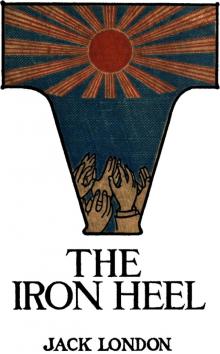 The Iron Heel
The Iron Heel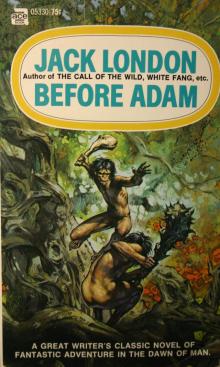 Before Adam
Before Adam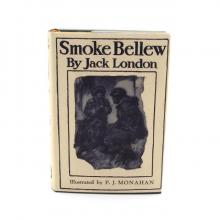 Smoke Bellew
Smoke Bellew The Call of the Wild
The Call of the Wild The Valley of the Moon Jack London
The Valley of the Moon Jack London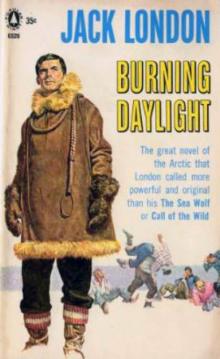 Burning Daylight
Burning Daylight The Sea Wolf
The Sea Wolf White Fang
White Fang A Daughter of the Snows
A Daughter of the Snows The Night-Born
The Night-Born A Son Of The Sun
A Son Of The Sun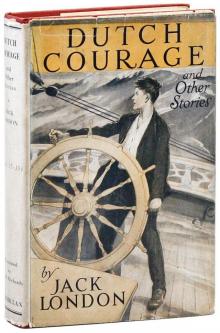 Dutch Courage and Other Stories
Dutch Courage and Other Stories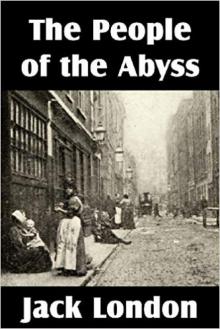 The People of the Abyss
The People of the Abyss Michael, Brother of Jerry
Michael, Brother of Jerry Love of Life, and Other Stories
Love of Life, and Other Stories Lost Face
Lost Face The Road
The Road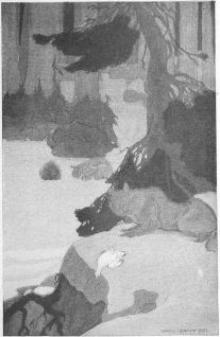 Love of Life
Love of Life The Turtles of Tasman
The Turtles of Tasman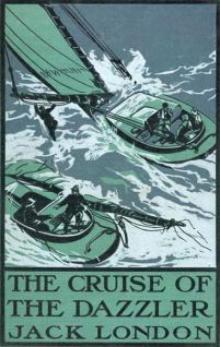 The Cruise of The Dazzler
The Cruise of The Dazzler The Heathen
The Heathen The Scab
The Scab The Faith of Men
The Faith of Men Adventure
Adventure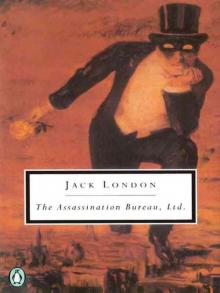 The Assassination Bureau, Ltd.
The Assassination Bureau, Ltd. The Call of the Wild, White Fang, and Other Stories
The Call of the Wild, White Fang, and Other Stories The Call of the Wild and Selected Stories
The Call of the Wild and Selected Stories Jerry of the Islands
Jerry of the Islands Hearts of Three
Hearts of Three The House of Pride
The House of Pride Moon-Face and Other Stories
Moon-Face and Other Stories Children of the Frost
Children of the Frost South Sea Tales
South Sea Tales The Strength of the Strong
The Strength of the Strong The Jacket (The Star-Rover)
The Jacket (The Star-Rover) The Little Lady of the Big House
The Little Lady of the Big House John Barleycorn
John Barleycorn ADaugter of Snows
ADaugter of Snows The Mutiny of the Elsinore
The Mutiny of the Elsinore Northland Stories
Northland Stories Tales of the Fish Patrol
Tales of the Fish Patrol Call of the Wild and White Fang (Barnes & Noble Classics Series)
Call of the Wild and White Fang (Barnes & Noble Classics Series) The Valley of the Moon
The Valley of the Moon The Cruise of the Snark
The Cruise of the Snark The Game
The Game An Autobiography of Jack London
An Autobiography of Jack London